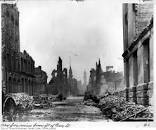Copy edits and fact checking are going on now for PATTERSON HOUSE and I suddenly realized I forgot an author’s note, which is a pretty typical thing to put in historical fiction. Who doesn’t like a little chat about sources and accuracy, something to the effect of this is history AND fiction, and how it is not possible be 100% accurate when I have inserted a completely fictional family into the mix? I have messed with the space time continuum. I have violated the prime directive. These actions leave marks.
Do I know who owned the Phoenix Block before it burned to the ground in the Great Fire of 1904? Well, yes, I actually do. But for the purposes of this book, it was William Patterson. Why? Because the imagery of the Phoenix is just too good to throw away.
Mr. Newton Wylie actually was a real person and a leader in the prohibition movement. And he really did break his back. I did not make him up. Or did I? Do I know if he was married or if he was the kind of man to notice a woman’s hat? No. No I don’t. But his name was too perfect to set aside. Mr. Newton Wylie is part of my PATTERSON HOUSE world now and welcome to him.
Bishop Strachan was certainly a real person. Do I know if he would have helped marry off a cousin in England? I do not. But this is what historical fiction is like.
What I like about historical fiction is the possibility of anchoring the story in real events. I believe it lends a story authenticity. What I also like about historical fiction is making the story up.
Somehow, I will get that into my author’s note.

